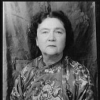Marjorie Kinnan Rawlings

Marjorie Kinnan Rawlings
Marjorie Kinnan Rawlings was an American author who lived in rural Florida and wrote novels with rural themes and settings. Her best known work, The Yearling, about a boy who adopts an orphaned fawn, won a Pulitzer Prize for fiction in 1939 and was later made into a movie of the same name. The book was written long before the concept of young-adult fiction, but is now commonly included in teen-reading lists...
NationalityAmerican
ProfessionAuthor
Date of Birth8 August 1896
CountryUnited States of America
it is my conviction that the personality of the writer has nothing to do with the literate product of his mind. And publicity in this case embarrasses me because I am acutely conscious of how far short the book falls of the artistry I am struggling to achieve. It's like being caught half-dressed.
It seems to me that the earth may be borrowed but not bought. It may be used but not owned. We are tenants, not possessors, lovers and not masters.
Life is strong stuff, some of us can bear more of it than others.
Now, having left cities behind me, turned Away forever from the strange, gregarious Huddling of men by stones, I find those various Great towns I knew fused into one, burned Together in the fire of my despising...
Two elements enter into successful and happy gatherings at table. The food, whether simple or elaborate, must be carefully prepared; willingly prepared; imaginatively prepared. And the guests - friends, family or strangers - must be conscious of their welcome.
No man should have proprietary rights over land who does not use that land wisely and lovingly.
Writing is agony for me. I work at it eight hours every day, hoping to get six pages, but I am satisfied with three.
Cross Creek belongs to the wind and the rain, to the sun and the seasons, to the cosmic secrecy of seed, and beyond all, to time.
Men had reached into the scrub and along its boundaries, had snatched what they could get and had gone away, uneasy in that vast indifferent peace; for a man was nothing, crawling ant-like among the myrtle bushes under the pines. Now they were gone, it was as though they had never been. The silence of the scrub was primordial. The wood-thrush crying across it might have been the first bird in the world-or the last.
A man'll seem like a person to a woman, year in, year out. She'll put up and she'll put up. Then one day he'll do something maybe no worse than what he's been a-doing all his life. She'll look at him. And without no warning he'll look like a varmint.
Readers themselves, I think, contribute to a book. They add their own imaginations, and it is as though the writer only gave them something to work on, and they did the rest.
Food imaginatively and lovingly prepared, and eaten in good company, warms the being with something more than the mere intake of calories. I cannot conceive of cooking for friends or family, under reasonable conditions, as being a chore.
We cannot live without the Earth or apart from it, and something is shrivelled in a man's heart when he turns away from it and concerns himself only with the affairs of men
Fear is the most easily taught of all lessons, and the fight against terror, real or imagined, is perhaps the history of man's mind.